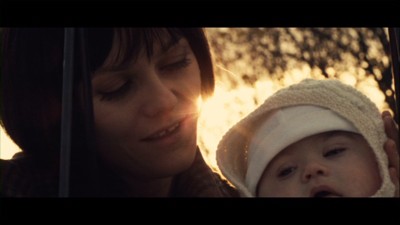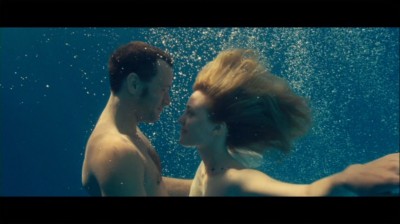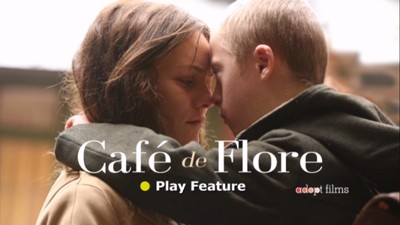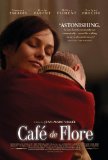| Reviews & Columns |
|
Reviews DVD TV on DVD Blu-ray 4K UHD International DVDs In Theaters Reviews by Studio Video Games Features Collector Series DVDs Easter Egg Database Interviews DVD Talk Radio Feature Articles Columns Anime Talk DVD Savant Horror DVDs The M.O.D. Squad Art House HD Talk Silent DVD
|
DVD Talk Forum |
|
|
| Resources |
|
DVD Price Search Customer Service #'s RCE Info Links |
|
Columns
|
|
|
Cafe de Flore
Kino // Unrated // January 14, 2014
List Price: $29.95 [Buy now and save at Amazon]
The Film:
 Whether or not a film ultimately needs to back up its dramatic integrity with the culmination of the story's foreshadowing and premise -- basically, whether the journey is more important than the destination -- gets put to the test in Jean-Marc Vallee's Cafe de Flore. On one hand, the director of recent Oscar nominees Dallas Buyers Club and The Young Victoria has assembled a mesmerizing and poetic piece of work about raising children, divorce, and music's resonance across time, chronicling two divergent sets of lives that take place fifty years apart. On the other hand, it's also a blurred abstraction that builds expectations toward the eventual discovery of how they do, in fact, relate: what a successful DJ and father of two embroiled in divorce shares in common with a doting mother raising a child with Down syndrome in '60s Paris. The outlandish connection at the heart of Cafe de Flore is, unfortunately, far less convincing than the powerful character drama that precedes it.
Whether or not a film ultimately needs to back up its dramatic integrity with the culmination of the story's foreshadowing and premise -- basically, whether the journey is more important than the destination -- gets put to the test in Jean-Marc Vallee's Cafe de Flore. On one hand, the director of recent Oscar nominees Dallas Buyers Club and The Young Victoria has assembled a mesmerizing and poetic piece of work about raising children, divorce, and music's resonance across time, chronicling two divergent sets of lives that take place fifty years apart. On the other hand, it's also a blurred abstraction that builds expectations toward the eventual discovery of how they do, in fact, relate: what a successful DJ and father of two embroiled in divorce shares in common with a doting mother raising a child with Down syndrome in '60s Paris. The outlandish connection at the heart of Cafe de Flore is, unfortunately, far less convincing than the powerful character drama that precedes it.
The film's title comes from a piece of music that permeates throughout the story, notably an important part of the everyday routine of Laurent (Marin Gerrier), a disabled boy lovingly raised by Jacqueline (Vanessa Paradis) to be as healthy and high-functioning as possible. Her oath to go above and beyond in her parenting also comes with a degree of protectiveness and control for her son, along with an almost-complete sacrifice of her personal life. Through juxtaposition of the storylines, we're introduced to the idea that Jacqueline and Laurent might somehow factor into the lives of Antoine (Kevin Parent) and Carole (Helene Florent) in modern-era Canada, whose twenty-year relationship abruptly fell apart once curly-haired beauty Rose (Evelyne Brochu) entered Antoine's life. Together with her children's frustration toward their father, Carole cannot reach a point where she's able to let go of her husband. Direct connections between these two stories appear nonexistent; however, Carole finds herself fascinated by dreams of Paris and a young disabled boy.
Cafe de Flore shifts between time periods in ways reinforced by Jean-Marc Vallee's graceful eye for aesthetics, making the transitions visually engrossing as they further hint towards a conflagration point. The material set during '60s Paris is underscored by dark, rich tans and blues for a vintage effect, allowing the constant movement of Pierre Cottereau's cinematography to relish small details like the stacked chairs and a downhill stream of rainwater that adorn Laurent's walks to school. Expectedly, the modern-era sequences focus on lucidity and vibrant tones that keeps camera motion to a minimum, focusing on close-ups and expressions as Antoine falls for Rose and reacts to Carole and his daughters. Music also becomes more prominent in the contemporary sequences, used both to express passion and provocation as a backdrop to the thriving DJ's personal life; it's easy to appreciate Jean-Marc Vallee's extended usage of Sigur Ros' haunting, ethereal track Svefn-G-Englar as a way of accentuating Antoine's soul-stirring transition.
relish small details like the stacked chairs and a downhill stream of rainwater that adorn Laurent's walks to school. Expectedly, the modern-era sequences focus on lucidity and vibrant tones that keeps camera motion to a minimum, focusing on close-ups and expressions as Antoine falls for Rose and reacts to Carole and his daughters. Music also becomes more prominent in the contemporary sequences, used both to express passion and provocation as a backdrop to the thriving DJ's personal life; it's easy to appreciate Jean-Marc Vallee's extended usage of Sigur Ros' haunting, ethereal track Svefn-G-Englar as a way of accentuating Antoine's soul-stirring transition.
Taken separately, the sides of Cafe de Flore's story are comprised of nuanced glimpses at two very different lives built on disparate conflicts, connected only by faintly similar themes about the pitfalls of parenting and coming to grips with an inability to control others. Jean-Marc Vallee's grasp on the difficulties and joys of raising a child with special needs is to be commended: Vanessa Paradis displays a quietly turbulent, profound rendering of Laurent's mother, accentuating highs and lows through the writing's excellent grasp on how she gets her son through bullying and an attachment to a fellow student, Vero, who also has Down syndrome. The film also understands the passive-aggressive complexity of coping with marital separation during the current era, along with the disappointment expressed by family members about the selfish decisions made around divorce and new loves. Jean-Marc Vallee's script expresses its points without a black-and-white grasp on principles, whether it's about parenting, substance abuse, or making decisions about relationships.
That's why it's frustrating to see Cafe de Flore suffer such a narrative blow once it divulges the connection between the past and the present, a vexing and heavy-handed twist designed to tickle the fancy of new-age mystics in search of the next Mr. Nobody or Cloud Atlas. The substance generated in Vallee's two intimately challenging stories must shoulder the burden of a plot revelation -- one only tangentially foreshadowed -- that's hinged on an unruly manifestation of spirituality, destiny, and recompense. While the ideas at the heart of this abstraction can be gratifying in a different context, the film ultimately relies too heavily on them as a surprise emotional lynchpin for its final act, retroactively changing one's perception of everything prior. It's tempting to overlook the last thirty minutes and simply appreciate what Jean-Marc Vallee expresses in his journey about parenthood and the complexities of discovering a new soulmate amid divorce, but its sloppy philosophical tune becomes tough to shake while approaching the film's destination that aims to bring it all together.
Video and Audio:
The brightest spot of Adopt Films' DVD presentation of Cafe de Flore comes in its widescreen-enhanced transfer, accurately framed at 2.35:1 and exhibiting a tremendous grasp on the film's palette, complex contrast levels, and shifts in clarity between time periods. Scenes set in late-'60s Paris often feature a layer of grain while leaning toward browns and deep blues, yet the disc's grasp on fine detail and balanced black levels keep all elements clear and engaging to the eyes. Modern-day sequences are more traditionally robust, sporting elegant skin tone as well as clarity of detail during close-ups and in background details that weren't anticipated from a standard-definition treatment. It's not perfect, occasionally a little hazier than it should be and sporting some black-level crush in a few areas, but the film looks splendid.
yet the disc's grasp on fine detail and balanced black levels keep all elements clear and engaging to the eyes. Modern-day sequences are more traditionally robust, sporting elegant skin tone as well as clarity of detail during close-ups and in background details that weren't anticipated from a standard-definition treatment. It's not perfect, occasionally a little hazier than it should be and sporting some black-level crush in a few areas, but the film looks splendid.
Unfortunately, the DVD only arrives with only a French 2.0 Dolby Stereo track, which does less to compliment the robust music sequences and modest sound design than I would've liked, despite the soundtrack sounding pretty darn strong from the front channels. Bass thump and mid-level clarity make the tunes of Sigur Ros and the film's signature track -- all its incarnations -- sound great. There are also a lot of sneaky sonic elements that would've benefitted from the bump in surround activity, such as the rumble of underwater bubbles and the aggressive sounds of speeding cars, but again the vigor and balance expressed from the front-end side of things still make the experience pleasant. Burnt-in English subtitles are largely pretty satisfying, barring a grammatical hiccup here and there.
Special Features:
Not a thing.
Final Thoughts:
Focused on the nuances of parenthood and divorce across two time periods, Cafe de Flore's compelling and haunting character exploration exhibits quite a bit of the challenging emotional depth one might expect from writer/director Jean-Marc Vallee, complimented by mysterious suggestions about how the two eras are connected. The sides of the story, both the one about raising a special-needs child in '60s Paris and the one about coping with divorce and new romance in the contemporary era, exhibit clear, affective filmmaking that know how to strike chords of depth and authenticity. It's a shame to see it get overpowered by tedious mystical overexertion in its final act, a revelation that's intrusive enough to color one's perception of the well-crafted drama that came before it. It left me befuddled instead of touched on the profound level that it might have with simpler, less assertive realization of its metaphysical concepts. Rent It.
Thomas Spurlin, Staff Reviewer -- DVDTalk Reviews | Personal Blog/Site
 Whether or not a film ultimately needs to back up its dramatic integrity with the culmination of the story's foreshadowing and premise -- basically, whether the journey is more important than the destination -- gets put to the test in Jean-Marc Vallee's Cafe de Flore. On one hand, the director of recent Oscar nominees Dallas Buyers Club and The Young Victoria has assembled a mesmerizing and poetic piece of work about raising children, divorce, and music's resonance across time, chronicling two divergent sets of lives that take place fifty years apart. On the other hand, it's also a blurred abstraction that builds expectations toward the eventual discovery of how they do, in fact, relate: what a successful DJ and father of two embroiled in divorce shares in common with a doting mother raising a child with Down syndrome in '60s Paris. The outlandish connection at the heart of Cafe de Flore is, unfortunately, far less convincing than the powerful character drama that precedes it.
Whether or not a film ultimately needs to back up its dramatic integrity with the culmination of the story's foreshadowing and premise -- basically, whether the journey is more important than the destination -- gets put to the test in Jean-Marc Vallee's Cafe de Flore. On one hand, the director of recent Oscar nominees Dallas Buyers Club and The Young Victoria has assembled a mesmerizing and poetic piece of work about raising children, divorce, and music's resonance across time, chronicling two divergent sets of lives that take place fifty years apart. On the other hand, it's also a blurred abstraction that builds expectations toward the eventual discovery of how they do, in fact, relate: what a successful DJ and father of two embroiled in divorce shares in common with a doting mother raising a child with Down syndrome in '60s Paris. The outlandish connection at the heart of Cafe de Flore is, unfortunately, far less convincing than the powerful character drama that precedes it. The film's title comes from a piece of music that permeates throughout the story, notably an important part of the everyday routine of Laurent (Marin Gerrier), a disabled boy lovingly raised by Jacqueline (Vanessa Paradis) to be as healthy and high-functioning as possible. Her oath to go above and beyond in her parenting also comes with a degree of protectiveness and control for her son, along with an almost-complete sacrifice of her personal life. Through juxtaposition of the storylines, we're introduced to the idea that Jacqueline and Laurent might somehow factor into the lives of Antoine (Kevin Parent) and Carole (Helene Florent) in modern-era Canada, whose twenty-year relationship abruptly fell apart once curly-haired beauty Rose (Evelyne Brochu) entered Antoine's life. Together with her children's frustration toward their father, Carole cannot reach a point where she's able to let go of her husband. Direct connections between these two stories appear nonexistent; however, Carole finds herself fascinated by dreams of Paris and a young disabled boy.
Cafe de Flore shifts between time periods in ways reinforced by Jean-Marc Vallee's graceful eye for aesthetics, making the transitions visually engrossing as they further hint towards a conflagration point. The material set during '60s Paris is underscored by dark, rich tans and blues for a vintage effect, allowing the constant movement of Pierre Cottereau's cinematography to
 relish small details like the stacked chairs and a downhill stream of rainwater that adorn Laurent's walks to school. Expectedly, the modern-era sequences focus on lucidity and vibrant tones that keeps camera motion to a minimum, focusing on close-ups and expressions as Antoine falls for Rose and reacts to Carole and his daughters. Music also becomes more prominent in the contemporary sequences, used both to express passion and provocation as a backdrop to the thriving DJ's personal life; it's easy to appreciate Jean-Marc Vallee's extended usage of Sigur Ros' haunting, ethereal track Svefn-G-Englar as a way of accentuating Antoine's soul-stirring transition.
relish small details like the stacked chairs and a downhill stream of rainwater that adorn Laurent's walks to school. Expectedly, the modern-era sequences focus on lucidity and vibrant tones that keeps camera motion to a minimum, focusing on close-ups and expressions as Antoine falls for Rose and reacts to Carole and his daughters. Music also becomes more prominent in the contemporary sequences, used both to express passion and provocation as a backdrop to the thriving DJ's personal life; it's easy to appreciate Jean-Marc Vallee's extended usage of Sigur Ros' haunting, ethereal track Svefn-G-Englar as a way of accentuating Antoine's soul-stirring transition. Taken separately, the sides of Cafe de Flore's story are comprised of nuanced glimpses at two very different lives built on disparate conflicts, connected only by faintly similar themes about the pitfalls of parenting and coming to grips with an inability to control others. Jean-Marc Vallee's grasp on the difficulties and joys of raising a child with special needs is to be commended: Vanessa Paradis displays a quietly turbulent, profound rendering of Laurent's mother, accentuating highs and lows through the writing's excellent grasp on how she gets her son through bullying and an attachment to a fellow student, Vero, who also has Down syndrome. The film also understands the passive-aggressive complexity of coping with marital separation during the current era, along with the disappointment expressed by family members about the selfish decisions made around divorce and new loves. Jean-Marc Vallee's script expresses its points without a black-and-white grasp on principles, whether it's about parenting, substance abuse, or making decisions about relationships.
That's why it's frustrating to see Cafe de Flore suffer such a narrative blow once it divulges the connection between the past and the present, a vexing and heavy-handed twist designed to tickle the fancy of new-age mystics in search of the next Mr. Nobody or Cloud Atlas. The substance generated in Vallee's two intimately challenging stories must shoulder the burden of a plot revelation -- one only tangentially foreshadowed -- that's hinged on an unruly manifestation of spirituality, destiny, and recompense. While the ideas at the heart of this abstraction can be gratifying in a different context, the film ultimately relies too heavily on them as a surprise emotional lynchpin for its final act, retroactively changing one's perception of everything prior. It's tempting to overlook the last thirty minutes and simply appreciate what Jean-Marc Vallee expresses in his journey about parenthood and the complexities of discovering a new soulmate amid divorce, but its sloppy philosophical tune becomes tough to shake while approaching the film's destination that aims to bring it all together.
Video and Audio:
The brightest spot of Adopt Films' DVD presentation of Cafe de Flore comes in its widescreen-enhanced transfer, accurately framed at 2.35:1 and exhibiting a tremendous grasp on the film's palette, complex contrast levels, and shifts in clarity between time periods. Scenes set in late-'60s Paris often feature a layer of grain while leaning toward browns and deep blues,
 yet the disc's grasp on fine detail and balanced black levels keep all elements clear and engaging to the eyes. Modern-day sequences are more traditionally robust, sporting elegant skin tone as well as clarity of detail during close-ups and in background details that weren't anticipated from a standard-definition treatment. It's not perfect, occasionally a little hazier than it should be and sporting some black-level crush in a few areas, but the film looks splendid.
yet the disc's grasp on fine detail and balanced black levels keep all elements clear and engaging to the eyes. Modern-day sequences are more traditionally robust, sporting elegant skin tone as well as clarity of detail during close-ups and in background details that weren't anticipated from a standard-definition treatment. It's not perfect, occasionally a little hazier than it should be and sporting some black-level crush in a few areas, but the film looks splendid. Unfortunately, the DVD only arrives with only a French 2.0 Dolby Stereo track, which does less to compliment the robust music sequences and modest sound design than I would've liked, despite the soundtrack sounding pretty darn strong from the front channels. Bass thump and mid-level clarity make the tunes of Sigur Ros and the film's signature track -- all its incarnations -- sound great. There are also a lot of sneaky sonic elements that would've benefitted from the bump in surround activity, such as the rumble of underwater bubbles and the aggressive sounds of speeding cars, but again the vigor and balance expressed from the front-end side of things still make the experience pleasant. Burnt-in English subtitles are largely pretty satisfying, barring a grammatical hiccup here and there.
Special Features:
Not a thing.
Final Thoughts:
Focused on the nuances of parenthood and divorce across two time periods, Cafe de Flore's compelling and haunting character exploration exhibits quite a bit of the challenging emotional depth one might expect from writer/director Jean-Marc Vallee, complimented by mysterious suggestions about how the two eras are connected. The sides of the story, both the one about raising a special-needs child in '60s Paris and the one about coping with divorce and new romance in the contemporary era, exhibit clear, affective filmmaking that know how to strike chords of depth and authenticity. It's a shame to see it get overpowered by tedious mystical overexertion in its final act, a revelation that's intrusive enough to color one's perception of the well-crafted drama that came before it. It left me befuddled instead of touched on the profound level that it might have with simpler, less assertive realization of its metaphysical concepts. Rent It.
|
| Popular Reviews |
| Sponsored Links |
|
|
| Sponsored Links |
|
|
| Release List | Reviews | Shop | Newsletter | Forum | DVD Giveaways | Blu-Ray | Advertise |
|
Copyright 2024 DVDTalk.com All Rights Reserved. Legal Info, Privacy Policy, Terms of Use,
Manage Preferences,
Your Privacy Choices | |||||||














